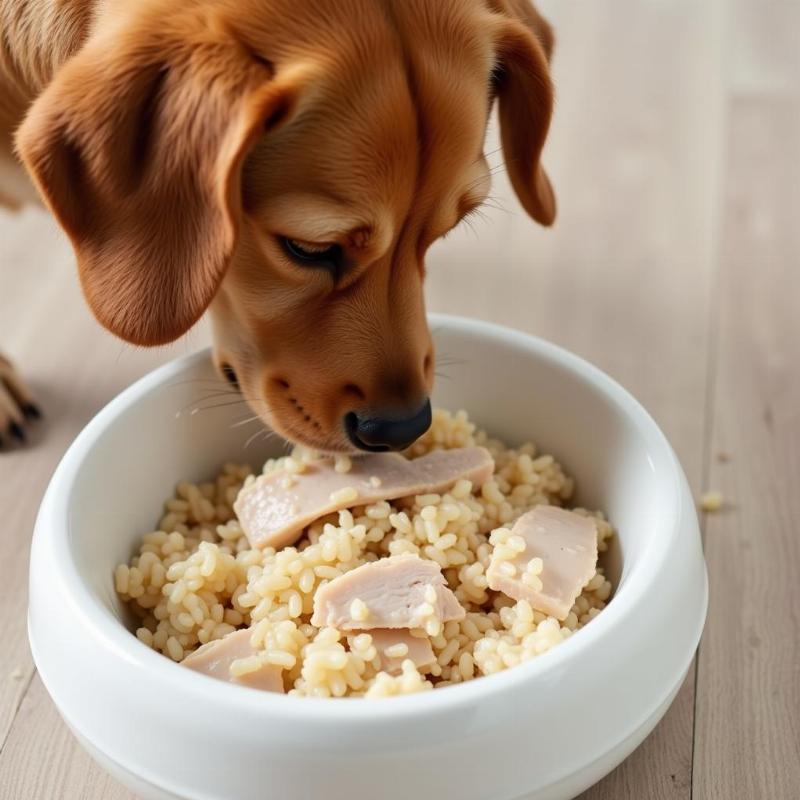If your dog has diarrhea after their anal glands were expressed, you’re likely concerned. This isn’t an uncommon occurrence and can be caused by a few different factors. This article will explore the reasons why your dog might experience diarrhea after anal gland expression, what you can do to help, and when it’s time to call your vet.
Why Does Diarrhea Sometimes Follow Anal Gland Expression?
Several factors can contribute to diarrhea after anal gland expression. Sometimes, the process itself can be a bit stressful for your dog, and stress can manifest as digestive upset. Another possibility is that the expression stimulated the bowels. Finally, if your dog already had underlying digestive issues, the expression might have exacerbated them.
Is It Normal for a Dog to Have Diarrhea After Glands Expressed?
While not uncommon, diarrhea after anal gland expression isn’t necessarily “normal.” It indicates that something might be a little off. It’s always a good idea to monitor your dog closely after this procedure. If the diarrhea is mild and resolves quickly, it’s probably nothing to worry about. However, persistent or severe diarrhea warrants a vet visit.
What to Do if Your Dog Has Diarrhea After Anal Gland Expression
If your dog develops diarrhea after having their anal glands expressed, here’s what you can do:
- Monitor your dog: Observe the frequency, consistency, and presence of blood in the stool.
- Bland diet: Offer a bland diet of boiled chicken and rice to help soothe the digestive tract.
- Hydration: Ensure your dog has access to plenty of fresh water to prevent dehydration.
- Probiotics: Consider adding a dog-specific probiotic to their food to help restore gut flora.
 Dog eating a bland diet of chicken and rice
Dog eating a bland diet of chicken and rice
When to Seek Veterinary Care
While mild, short-lived diarrhea can often be managed at home, some situations require immediate veterinary attention. Contact your veterinarian if your dog experiences:
- Bloody diarrhea: This could indicate a more serious issue.
- Lethargy or weakness: These are signs of dehydration.
- Vomiting: Combined with diarrhea, vomiting can lead to severe dehydration quickly.
- Loss of appetite: This could signal a more significant underlying problem.
- Diarrhea lasting more than 24 hours: Persistent diarrhea needs professional evaluation.
Preventing Diarrhea After Anal Gland Expression
While not always preventable, there are some steps you can take to minimize the risk of diarrhea after anal gland expression:
- Experienced groomer or vet: Ensure the expression is performed by a trained professional.
- Regular expressions: If your dog frequently requires anal gland expression, maintaining a regular schedule might help.
- Dietary fiber: Adding fiber to your dog’s diet can sometimes help regulate anal gland function. Consult with your veterinarian before making any dietary changes.
Conclusion
Diarrhea after anal gland expression can be concerning but is often manageable. By monitoring your dog, providing supportive care, and knowing when to seek veterinary help, you can ensure your furry friend gets back to feeling their best.
FAQ
- How long does diarrhea after anal gland expression last? Typically, it resolves within 24 hours.
- Can I express my dog’s anal glands myself? It’s best to leave this to a trained professional to avoid injury.
- What causes anal gland problems in dogs? Several factors, including allergies, infections, and obesity, can contribute.
- Are certain breeds more prone to anal gland issues? Smaller breeds tend to experience problems more frequently.
- How can I tell if my dog’s anal glands need expressing? Signs include scooting, licking the area excessively, and a foul odor.
- Is there a way to permanently fix anal gland problems? In severe cases, surgical removal might be an option, but it’s typically a last resort.
- Can diet help with anal gland issues? Adding fiber can sometimes help, but always consult your vet before changing your dog’s diet.
Related Articles
About Beautdogs.us
Beautdogs.us is your premier resource for all things dog-related in the US. We provide expert advice on dog breeds, care, and products, empowering you to provide the best possible care for your canine companion. From puppyhood to senior years, we offer a wealth of information for both new and experienced dog owners. Contact us today for personalized support and guidance! Email: [email protected], Phone: +1 501-555-7529.